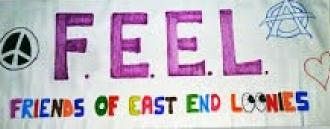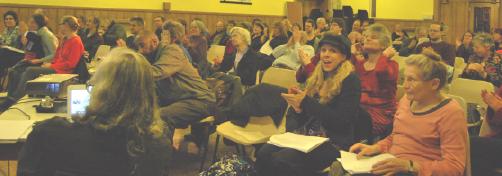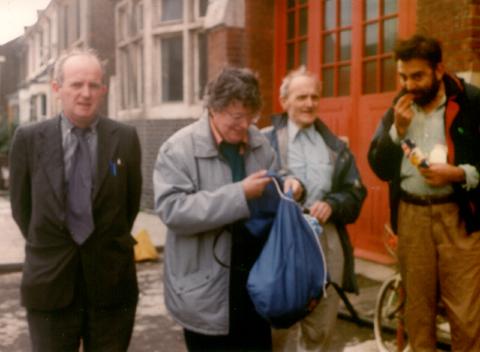|
A Pageant of Survivor History
Mental patients in poetry, story and song
from the 18th to 21st century
Followed by an open mike session for people to talk about their own
experiences.

|
Do not clap or boo individual performers - We are performing
together and you can let us know what you think at the end!
|

|

|
If viewing on the web, you are advised to first let the mudlarks drive you
crazy - as they did us on the night.
|
When you are sufficiently insane, we will travel back to the eighteenth
century
|

|
Tower Hamlets African and Caribbean Mental Health Organisation (THACMHO)
was established in 1996. Its symbol is Tabono representing strength,
confidence and perseverance.
|
Seeking to restore strength through history, THACMHO researched, wrote and
published
Power Writers and the Struggle Against Slavery - Celebrating
five African writers who came to the East End of London in the 18th century
Ukawsaw Gronniosaw was born a prince in Africa, somewhere near
Lake
Chad. - But he was a prince with a difference: He was considered foolish or
insane.
Ukawsaw was sold into slavery, crossed the Atlantic,
and became a domestic slave in New York. Eventually he was granted
freedom.
Ukawsaw crossed the Atlantic again to England
|
Near here, in Petticoat Lane, Ukawsaw met Betty
|
|
Mr Whitefield received me very friendly, was heartily glad to see me, and
directed me to a proper place to board and lodge in Petticoat Lane, till he
could think of some way to settle me in, and paid for all my lodgings and
expenses.
The morning after I came to my new lodging, as I was at breakfast with the
gentlewoman of the house, I heard the noise of some looms over our heads: I
enquired what it was; she told me that the person was weaving silk. I
expressed a great desire to see it...
... as soon as we entered the room, the person that was weaving looked
about, and smiled upon us, and I loved her from that moment.
She asked many questions and I in return talked a great deal to her.
I found that she was a member of Mr Allen's Meeting, and I began to
entertain a good opinion of her, though I was almost afraid to indulge this
inclination, lest she should prove like all he rest that I met with at
Portsmouth etc and which had almost given me a dislike of all white women.
But after a short acquaintance I had the happiness to find she was quite
different, and quite sincere, and I was not without hope that she
entertained some esteem for me.
|

|
Ukawsaw Gronniosaw went to Holland
|
|
My lady proposed my marrying her maid; she was an agreeable young woman,
had saved a great deal of money, but I could not fancy her, though she was
willing to accept of me.
I told her my inclinations were engaged in England, and I could think of no
other person.
On my return home, I found my Betty disengaged. She had refused several
offers in my absence, and told her sister that, she thought, if ever she
married I was to be her husband.
|
|
Betty married Ukawsaw and, with their children, moved to Essex
|
|
My dear wife and I were now both unemployed, we could get nothing to do.
The winter proved remarkably severe, and we were reduced to the greatest
distress... our last bit of bread was gone... to see my dear wife and
children in want pierced me to the heart - I now blamed myself for bringing
her from London, as doubtless had we continued there we might have found
friends to keep us from starving...
The snow was at this season remarkably deep...
I resolved to make my case know to a gentleman's gardener that lived near
us, and entreat him to employ me... I endeavoured all I could to prevail on
him to set me to work, but to no purpose: he assured me it was not in his
power.
When I was about to leave him, he asked me if I would accept some carrots?
... He gave me four, they were very large and fine - We had nothing to make
fire with, so consequently we could not boil them: But was glad to have
them to eat raw. Our youngest child was then an infant, so that my wife was
obliged to chew it, and feed her in that manner for several days.
We allowed ourselves but one every day, least they should not last 'till we
could get some other supply.
|
The nineteenth century confined more and more people in lunatic asylums.
One of these was John Clare, the rural poet who continued to write
poetry from the asylum for the rest of his life.
His sonnet The Nightingale was written on
June 12th 1844 in the
Asylum at Northampton
where Clare was confined from 1842 to his death on
May 20th 1864.
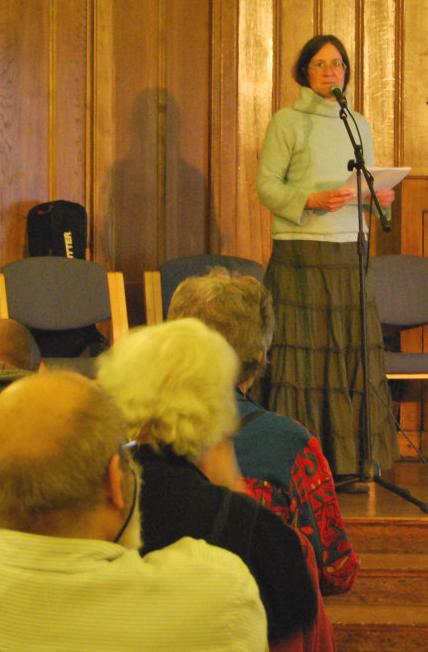
|
This is the month the Nightingale, clod-brown,
Is heard among the woodland shady boughs;
This is the time when, in the vale, grass-grown,
The maiden hears at eve her lover's vows,
What time the blue mist, round the patient cows,
Dim rises from the grass, and half conceals
Their dappled hides. I hear the nightingale,
That from the little blackthorn spinney steals
To the old hazel hedge that skirts the vale,
And still unseen, sings sweet. The ploughman feels
The thrilling music as he goes along,
And imitates and listens, - while the fields
Lose all their paths in dusk, to lead him wrong,
Still sings the Nightingale her soft melodious song.
|
Freda Mew was confined in an asylum from 1899, when she was only
nineteen, until her death in 1958.
Her sister Charlotte Mew was scared that her own mental
instability would be diagnosed as insanity.
Ken, in this poem by Charlotte, has similarities with Freda, as she
is described in her medical case notes. Magazine editors refused to
publish the poem - They thought people like Ken should be in
asylums.
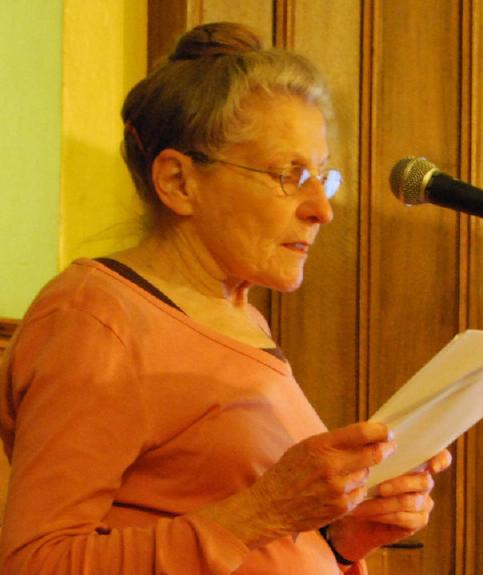
When first I came upon him there
Suddenly, on the half-lit stair,
I think I hardly found a trace
Of likeness to a human face
In his. And I said then
If in His image God made men,
Some other must have made poor Ken -
But for his eyes which looked at you
As two red, wounded stars might do.
He scarcely spoke, you scarcely heard,
His voice broke off in little jars
To tears sometimes. An uncouth bird
He seemed as he ploughed up the street,
Groping, with knarred, high-lifted feet
And arms thrust out as if to beat
Always against a threat of bars.
And oftener than not there'd be
A child just higher than his knee
Trotting beside him. Through his dim
Long twilight this, at least, shone clear,
That all the children and the deer,
Whom every day he went to see
Out in the park, belonged to him.
"God help the folk that next him sits
He fidgets so, with his poor wits."
The neighbours said on Sunday nights
When he would go to Church to "see the lights!"
... in that red brick barn upon the hill
I wonder - can one own the deer,
And does one walk with children still
As one did here -
Do roses grow
Beneath those twenty windows in a row -
And if some night
When you have not seen any light
They cannot move you from your chair
What happens there?
I do not know.
So, when they took
Ken to that place, I did not look
After he called and turned on me
His eyes. These I shall see -
|
From the asylums we hear the voices of collective action.
Patients found strength in mutual support.
|
The Royal Albert Institution for the Feeble-minded of the Northern Counties
18.7.1924
This statement is written by a patient and signed by patients.
On July 18th 1924 Patient James Ollier reported to the Chief Attendant the
bruise of patient William Dugdale on hip (penus) which Dugdale had said Mr
Hully had done it with kicking him.
The undersigned patients were present when the Chief Attendant replied
saying he did not believe it. Mr Hully would not do such a thing.
Also informed him to mind his own business.
J. Ollier
J. Holmes
A. Batty
G. Hilton
J. Morris
R. Longmore
|
In January 1955 Peter Whitehead was in solitary confinement at Rampton
top security hospital

|
"I decided I was being wrongfully shut away, because I knew I
wasn't
mentally defective, and ... I was not violent. I knew that I must go on
believing this, and go on hoping that one day I would be set free. No
matter how long I was imprisoned in Rampton, I was determined never to give
up."
Peter advised other patients to
"Write letters. Get people outside interested in you. Tell them you've been
wrongly shut away. If you stay quiet, nobody will lift a finger to help
you, however long you stay here"
|
|
Working through the National Council for Civil Liberties, large numbers
of patients, including Peter, won their liberty in the 1950s.
|
In the 1960s this building, Kingsley Hall, was an alternative
asylum.
Mary Barnes lived here from 1965 to 1970. In the course of her
treatment she came very close to death. Through her painting
and her love, Mary found inner sources of strength, and restored her life.
An ideal asylum, she thought, should be a place of
refuge and creativity.
|
I want in such a community as ours to see real freedom and respect towards
different ways of life.
I would like then, for Noel, a Meditation room with symbols of the Buddhist
way of life, decorated according to Noel's taste.
What we believe in our minds affects our bodies, and so for Noel and
others, a vegetarian diet.
Joe is Jewish. For him, the Passover seder, the ritualistic telling
of the
exodus from Egypt, is an expression of his being.
I am Christian and have been mad.
My madness uncovered more clearly and revealed the faith within me.
Going through madness is a purification, it brings me nearer to God, to
myself, helps me to a more conscious awareness of God, to a fuller
participation in the sight of God.
I desire facilities for 'going in' to further purify my remaining madness
to holiness, to wholeness.
That's the sort of place I want, something sacred, full of love.
|
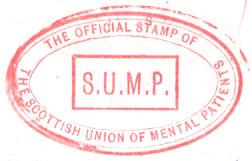
|
26.7.1971 "Petition for the Redress of Grievances put forward by the
patients in Hartwood Hospital, Shotts Lanarkshire". Scotland
"The signatories to the petition are the Foundation and Permanent Members
of SUMP The Scottish Union of Mental Patients"
|
SUMP was first mooted to Tommie Ritchie by another patient, Archie Meek,
aged 91:
"What are we old men to do if you ever leave us? We are divided from one
another. Start a union before you go - For divided we fall"

|
London 7.4.1973: A packed meeting of one hundred people founded The
Mental
Patients Union. By 1974 there were unions inside and outside of hospitals
up and down the country. Two of the founding member were Tommie Ritchie and
Eric Irwin
|
We proclaim the dignity of society's so-called mental patients
Mental patients in our society are treated as people with no human rights.
We are stigmatised, and our accounts of what happens to us in mental
hospitals and outside are taken as symptoms of an 'illness'.
Most of us are
never even given the opportunity to speak about what happens in mental
hospitals, as we are incarcerated there and subjected to 'treatments' which
destroy our memories, confuse our speech and co-ordination, destroy our
incentive and intimidate us.
Our first intent in forming ourselves into a
union is to fight against the 'conspiracy of deafness' that confronts us.
Friday 6.5.1974 4.30pm First meeting of Hackney Hospital MPU
"Alan Hartman explained what kind of things the mental patients union does.
Refusing treatment, cruelty to patients, clothes grants, fighting against
being discriminated against in jobs..."
"Resolved that a branch of the Mental Patients Union be formed in Hackney
Hospital... The meeting was adjourned after the senior nursing officer
attempted to break it up."
July 1974: Hackney Hospital Mental Patients Union won the right to
meet
When Eric Irwin died, Mike Lawson wrote a poem in tribute. The
images in these extracts recall the history of a movement.
|
Eric -
I have known you since the old days and the Paddington Day Hospital.
I remember then the first meeting of MPU
In those days everything was possible.
The handbills were given out, the fire was lit.
Some of us will always carry on that fight.
Prince of Wales and Kentish Town squat
The head was put into a spider web
Brian and Liz and political passion
To talk of psychiatric oppression
The flame was lit and its grown
COPE was born - Acklam Road - it felt like home.
Some books and lives later COPE to PROMPT
Singing songs at the Metropolitan.
ECT memories make shadows from time
We turned the ridiculous into sublime
Thank you a great teacher and a friend,
You helped me with your inspiration
And PROMPT became CAPO with deliberation.
As we all moved along
|

|
Eric Irwin was born in Belfast in 1926.
During his life he was in seventeen psychiatric institutions in Ireland,
Australia and England.
Eric experienced ECT when it caused epileptic fits and broke people's
backs, and his own back was damaged.
|
Eric took part in the campaign to save the Paddington Day Hospital.
With Liz Durkin, Lesley Mitchell and Brian Douieb, he wrote The Case for
a Mental Patients Union. He was also
part of the West London collective COPE (Community Organisation for
Psychiatric Emergencies). MPU had its first HQ in Prince of Wales Road,
Kentish Town and COPE had a base in Acklam Road, North Kensington.
Eric's involvement continued through PROMPT, a group that ran a crisis
phoneline and published books on the many issues of psychiatry, and,
through a petition to Parliament, campaigned against ECT.
In 1985 PROMPT changed its name to CAPO: - Campaign Against Psychiatric
Oppression. PROMPT and CAPO both used the MPU symbol: the head caught in a
spider's web.
In 1985 English users groups like CAPO were not invited to the World Mental
Health Conference in Brighton. Eric Irwin, Barry Blazeby and Frank Bangay,
attended, uninvited, joining in the international
alliance of patients who took over part of the conference and produced a
manifesto.
Music and poetry gigs were organised by Frank Bangay to raise money for
PROMPT and CAPO. The first few gigs took place at the Metropolitan, a
public house in Farringdon. They then moved to the Troubadour Coffee House
in Earls Court.
|
In the Summer of 1981 Matthew O'Hara Committee News was hand produced by
patients.
As well as articles on deaths in custody - PROMPT's Second National
Antipsychiatry Conference - and Janet Cresswell in Broadmoor - it included
this poem by David Kessel, a founder of Hackney
Mental Patient's Association
|
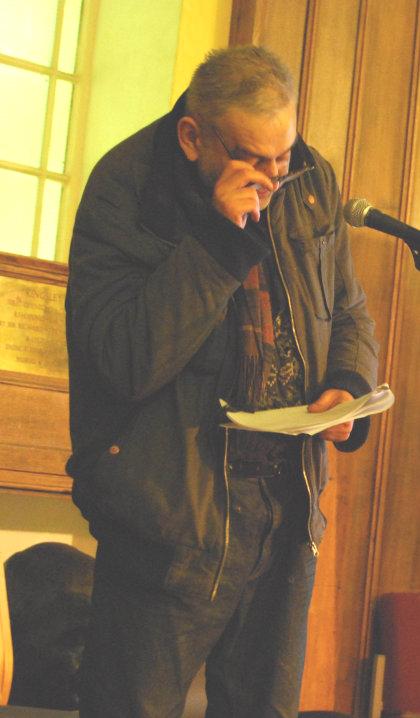

Hungering
Whilst I awkwardly roll a fag
a robin sings from a holly tree.
It is we who fence ourselves in.
Like foxes we hunger underground.
The rowan thrives in fierce winds.
The wind brings it rain, bears its leaves and fruit.
I pick a blackberry and find a worm.
I leave the worm to eat the flesh
so the pips may lie naked on the ground.
I turn my female god naturally
into the beetle in my hand.
Then with love I can watch it.
I'll go on making such magic till I die.
On harsh and bitter ground
nettles grow abundantly tall.
Cows make sweet milk from them.
In a sacred wood I dream
of life's conception.
This hawk in a tree hungers for life.
This jet-fighter for death.
If we were really like sheep
we would not kill one another
nor slaughter other animals.
I listen to an owl's ironic hooting.
It knows well its strength
but kills only what it needs.
Thus I will survive life's harshest winter.
To be a sea-trout seeking a mate
at the stream's head
I would live with her as wagtails
independently do by the stream.
The rain is falling into our valley of life and death,
falling on mankind's disintegration of cruelty.
The path becomes a muddy stream.
This is the way I see a woman I love
moving in her freedom with the dark purity of the earth.
Sometimes I feel like the bare sky
longing for the earth.
I have climbed this hill to learn to care.
|
Hidden from view

At the back of the hall, our sound technician,
Cristina Garcia, worked tirelessly to make sure we could all hear - and
Sue Dean, Jo Panter and Caroline Fenech from HUSH (Hidden Universe of
Self Harm) took care of the food.
|
I now introduce Peter Campbell, the first secretary of Survivors Speak
Out
Survivors Speak Out was founded early in 1986. For more than ten years it
was an important networking organisation for the growing survivor movement.
It owes its foundation to concerns that no UK service were represented at
the important World Mental Health Federation conference in Brighton in the
summer of 1985. Some money was found to enable two meetings of survivors
and their allies to take place and at the second of these, at Minstead
Lodge in the New Forest, the organisation was established and its name
chosen.
The main objectives of the organisation in the beginning was to produce a
newsletter and, most importantly, to organise a national conference where
survivor activists could come together. This eventually took place over a
weekend at Edale Youth Hostel in the Peak District in the autumn of
1987.
The event was important as it brought people from different parts of the UK
together for the first time. About 100 people attended, including a small
number of allies. Not all the attendees were members of Survivors Speak
Out. A Charter of Needs and Demands was unanimously agreed and a
public
statement opposing Community Treatment Orders was also agreed.
In the months following the Edale Conference it became clear that
Survivors Speak Out did
not have the resources to adopt a regional structure. Apart from anything
else, Mindlink was fast developing, building on Mind's regional structure.
Nevertheless, Survivors Speak Out played an important part in
spreading the word about the
possibilities of "self-advocacy" by sending speakers to local events where
service users were discussing action and by producing and selling A
Self-Advocacy Action Pack with practical advice about how to set up
and run a
local action group.
In addition to the Self-Advocacy Action Pack, Survivors Speak Out
produced three other
publications - Eating Distress - Stopovers on my Journey Home From
Mars (a
comparison of service user/survivor action in the USA, United Kingdom and
Europe - Self Harm: Perspectives From Personal Experience. The
latter was the most successful publication, proving to be a pioneering work
that is still in demand.
This is a poem I wrote for Survivors Speak Out:

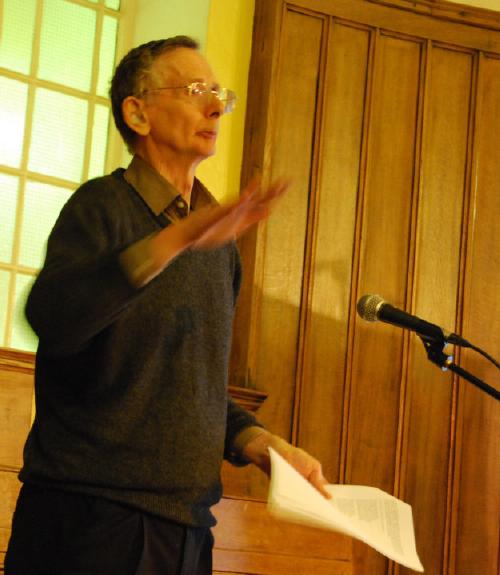
|
The Mental Marching Band
You'd better wet your whistles
For the Mental Marching Band
For we're making a wee comeback
And its spreading through the land.
And we'd laugh you to distraction
If we thought you'd understand
About the Mental Marching Band.
There's Danny Ogenkenyu
On the bagpipes by the way
And when he's took his Lithium
Sweet Jesus can he play.
You can denigrate the madness
The song won't fade away
From the Mental Marching Band.
We'll all be out and running
When the storm breaks.
Down the House of Commons
Wi' our fruitcake.
You'll have to take your medicine then
Just for he music's sake
And the Mental Marching Band.
We'll not be taking prisoners
Under the blood red skies.
We've had too much confinement
In our own lives.
We're getting our own World War out
That everyone survives.
Thanks to the Mental Marching Band.
Let's hear it.
|
David Kessel's Hackney Mental Patient's Association was followed by
Hackney Mental Health
Action Group and (in 1987) the Hackney Union of Mental Patients.
In this
picture, John Considine, Joan Hughes, Tony O'Donnel, and David Kessel
prepare to leave the Old Fire Station in Stoke Newington for an expedition
to Walthamstow Marshes.
Other HUMP members included John Roberts - John Considine - Pat
Walters - Harold Leeson - and Brendan and Martin Maher .
In the early 1990s the life of old Hackney Hospital, in Homerton High
Street, was drawing to a close and the emptying buildings became the site
of a creative outburst of activity.
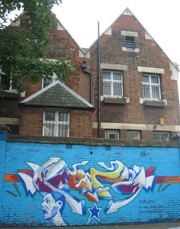
|
In 1992, Paul Monks, a local artist, used an abandoned ward at Hackney
Hospital as his studio. Patients from the psychiatric unit visited and,
with
limited funding, an open studio was created. Out of this Core Arts
was born in 1994.
In March 1994 Hackney Patients' Council was founded. At this time, there
were only two other patients councils in the country
known to the group. Hackney Patients' Council still represents patients in
the new Homerton Hospital.
|
One of the artistes who now works through Core Arts is the Gospel Singer,
Sophie Mirrell, who will now sing


|
Loneliness is not the will of God!
~~~~
It will not - Go without your decision
Go into the church to make it vanish in your mind
Read sometime the word of life
To give your spirit peace
Loneliness is not the will of God!
Yeah Yeah Yeah Yeah
It will not - Go without your decision
Remind God that he says
It's not good to live alone
He will make for him a helper
Loneliness is not the will of God!
Yeah Yeah Yeah Yeah
It will not - Go without your decision
Don't think bad about yourself
Appreciate your life
God we need your grace - To be happy
Loneliness is not the will of God!
Yeah Yeah Yeah Yeah
It will not - Go without your decision
Loneliness - Loneliness - Loneliness - Loneliness - Loneliness -
Loneliness - Loneliness - Loneliness - Loneliness - -
|




|
Autumn 1998 Mysterious notices all around the Maudsley Hospital warn
that
the tiger is coming.
17.12.1998 ... First official meeting of SIMBA (Share In
Maudsley Black Action)
The tiger continued roaring:
23.3.2000 SIMBA performed at the third Big Alternative Conference organised
by Strategies for Living
Asked to do a
presentation, Premila Trivedi thought of "transparencies, statistics and
charts", but the group thought it would be "so much more powerful to do it
through prose
and poetry"
|
Mad Pride developed from protests organised to
reclaim the cultural history of the mad. It's "first ever gig" was
held at the Foundry in Old Street, Shoreditch.
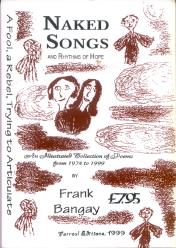
|
Frank Bangay read from Naked Songs and Rhythms
of Hope, his illustrated collection of poems from 1974 to 1999.
Franks poems are annotated and the book as a whole is one our richest
sources for the history of our movement.
Since 1999 Frank has continued to write and to perform. He has worked with
Sophie Mirrell and his poems have been recorded in a series of CDs produced
at Core Arts
|
Frank will now perform a poem about survival that he wrote in 1992 and read
on a video he made as part of the exhibition "Care and Control" on the
closure of Hackney Hospital. The poem is called
A Proud Rhythm
|

|
When a wind of chaos
Blows through our lives
It pulls meaning apart
In the aftermath
We sit and wonder
How to mend a broken heart
A saddened chuckle echoes through the darkness
It's a survival instinct that we know
And we wonder how did we lose sight of our worldview
The ideology we hold so close
Somehow our dreams slipped through shaking hands
How do we fit all the pieces together again
Reaching out for someone
Something special to hold on to
A madman tries to compose himself
So that he can fit in once more with the crowd.
He tries hard to make the mask fit
But it's not easy keeping a stiff upper lip
When there is so much to express.
So much confusion and bewilderment
At being alone in this hostile world.
When the medication starts taking control
Things can seem a little strange
Deep in our hearts we know
Thing's won't be the same again.
A mad person tries to be at one with the crowd
But you can't hide fearful eyes
The years are being singled out.
And you can't hide the worrylines
That run across your face
As you take your place in the competitive day.
But memories haunt in the deep of the night
Leaving a longing
To open up and cry
And to understand the experiences
That changed the meaning of our lives.
But a proud rhythm beats inside,
A proud rhythm beats inside,
A proud rhythm will keep beating inside,
A proud rhythm will keep beating inside,
Yes we will be strong this time.
|
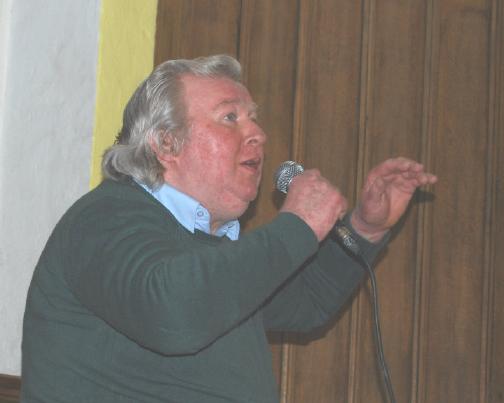

|
Performers and organisers will gather at the front to say thank you to the
audience in the usual way!
|

WE SURVIVE AND FLOURISH WHEN WE
RECOVER OUR OWN IDENTITIES FROM HISTORY.
Tower Hamlets African and Caribbean Mental Health Organisation (THACMHO)
c/o Social Action for Health, The Brady Centre, 192 Hanbury
Street, London, E1 5HU
website:
http://thacmho.wetpaint.com
Survivors History Group
177 Glenarm Road, London, E50NB
website:
http://studymore.org.uk
F.E.E.L. - Friends of East End Loonies
Meets LARC Centre, 62 Fieldgate Street, London, E1 1ES on the third
Monday of every month at 6.30 pm.
Contact David: 020 7790 0269 or Myra: 020 7780 9038
Asylum - the magazine for democratic psychiatry -
Normally
£3.50 -
Tonight £2.50. The mouthpiece of mental patients for 25
years.
website:
http://www.pccs-books.co.uk/
|
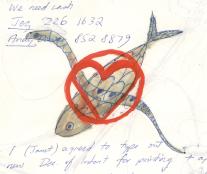
|
